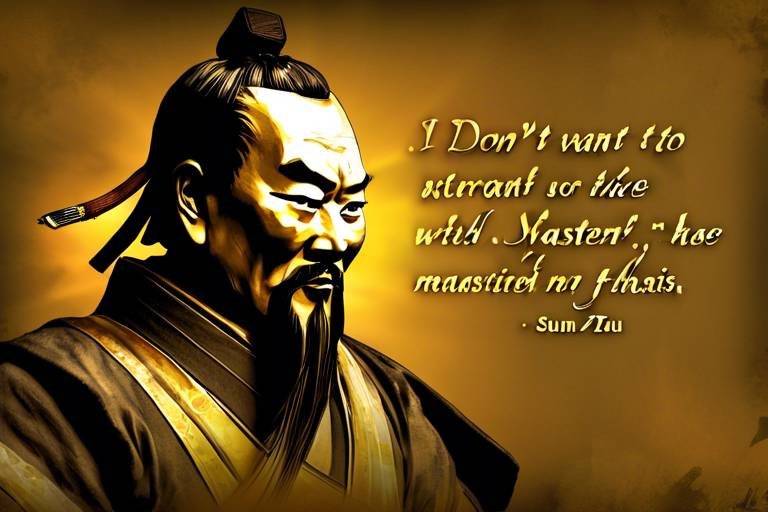Sun Tzu: The Master Strategist
Sun Tzu, known as the Master Strategist, was an ancient Chinese military general, philosopher, and writer who lived during the Eastern Zhou period. His profound insights into warfare and strategy have transcended time, making him a legendary figure in the realm of strategic thinking. Sun Tzu's teachings, particularly his renowned work "The Art of War," continue to influence military tactics, business strategies, and leadership philosophies across the globe.

Early Life and Background
Renowned for his timeless wisdom on strategy and warfare, Sun Tzu remains a revered figure in the realms of military tactics and leadership. This article will delve into the life, teachings, and lasting influence of the legendary Chinese strategist.
Sun Tzu's origins trace back to the ancient state of Qi in China, where he was believed to have been born in the 6th century BC. Little is known about his early life, but it is said that he received a traditional Chinese education, focusing on history, philosophy, and military strategy. Growing up in a tumultuous era of constant warfare and political intrigue, Sun Tzu's formative years were shaped by the chaos and uncertainty of the Warring States period.

The Art of War
Known for his unparalleled strategic wisdom, Sun Tzu remains a legendary figure in the realms of military tactics and leadership. His timeless teachings have transcended centuries, offering invaluable insights into the art of war and strategic thinking.
Central to Sun Tzu's legacy is his seminal work, 'The Art of War.' This ancient Chinese military treatise, composed of 13 chapters, delves into the intricacies of warfare, emphasizing the importance of strategy, deception, and adaptability on the battlefield. Sun Tzu's teachings revolve around the notion that victory is achieved through careful planning, understanding the enemy, and exploiting their weaknesses.
One of the key principles outlined in 'The Art of War' is the concept of winning without fighting, where the ultimate goal is to outsmart the opponent through superior strategy rather than engaging in direct confrontation. Sun Tzu's emphasis on intelligence gathering, positioning, and psychological warfare has made his treatise a timeless guide for military commanders and strategists.
Moreover, Sun Tzu's strategic insights extend beyond the battlefield, offering valuable lessons that can be applied to various aspects of life, including business, politics, and personal development. His emphasis on adaptability, foresight, and the importance of knowing oneself and the enemy continues to resonate with individuals seeking success in competitive environments.

Leadership Philosophy
Sun Tzu's leadership philosophy is deeply rooted in the belief that a successful leader must possess a combination of strategic thinking, adaptability, and the ability to inspire and guide their followers towards a common goal. Central to Sun Tzu's philosophy is the idea that leadership is not just about issuing orders but about understanding the strengths and weaknesses of one's own forces and those of the enemy. Sun Tzu emphasizes the importance of leading by example and earning the respect and loyalty of one's subordinates through competence and integrity.
One of the key principles of Sun Tzu's leadership philosophy is the concept of "knowing yourself and knowing your enemy." This involves a profound understanding of one's own capabilities and limitations, as well as a comprehensive assessment of the opponent's strengths and weaknesses. By leveraging this knowledge, a leader can make informed decisions and devise effective strategies that exploit the vulnerabilities of the adversary while safeguarding their own position.
Furthermore, Sun Tzu stresses the significance of adaptability and flexibility in leadership. He advocates for the ability to adjust tactics and approaches based on changing circumstances and unexpected developments on the battlefield. A successful leader, according to Sun Tzu, must be agile in thought and action, capable of responding swiftly to challenges and seizing opportunities as they arise.
In addition to strategic acumen and adaptability, Sun Tzu places great emphasis on the moral and ethical dimensions of leadership. He argues that a leader must act with fairness, compassion, and benevolence towards their troops, earning their trust and loyalty through virtuous conduct. Sun Tzu believes that a leader who embodies these qualities will inspire unwavering loyalty and dedication from their followers, fostering a cohesive and resilient team.
Overall, Sun Tzu's leadership philosophy is a holistic approach that combines strategic foresight, adaptability, ethical conduct, and the ability to inspire and unite individuals towards a common purpose. By embodying these principles, a leader can navigate complex challenges, outmaneuver adversaries, and achieve victory both on the battlefield and in the realm of leadership and influence.

Strategic Principles
Sun Tzu's strategic principles are deeply rooted in the art of deception, positioning, and the relentless pursuit of intelligence. One of his key teachings is the concept of knowing your enemy and yourself in order to achieve victory. Sun Tzu emphasizes the importance of adaptability in strategy, highlighting the need to be flexible and responsive to changing circumstances. He believed that deception is a crucial element of warfare, advocating for the use of misinformation and psychological tactics to outmaneuver the opponent.
Furthermore, Sun Tzu's strategic principles revolve around the idea of positioning as a means to gain a competitive advantage. He stresses the significance of choosing the right battlefield and timing to maximize the chances of success. Sun Tzu also underlines the importance of intelligence gathering, stating that information is a critical asset in decision-making and planning.
Incorporating these strategic principles, Sun Tzu's teachings emphasize the holistic approach to strategy, where every aspect of a situation is carefully considered and integrated into the overall plan. He encourages leaders to anticipate the enemy's moves, stay one step ahead, and exploit vulnerabilities effectively.

Legacy and Influence
When it comes to the legacy and influence of Sun Tzu, one cannot underestimate the profound impact his teachings have had on various aspects of strategy and leadership. Sun Tzu's timeless wisdom, as outlined in his seminal work "The Art of War," continues to resonate across different fields, from military tactics to business strategies.
One of the key elements of Sun Tzu's legacy is his emphasis on the importance of understanding the terrain, both literal and metaphorical, in any strategic endeavor. By recognizing the unique challenges and opportunities presented by different environments, leaders can adapt their approaches to achieve success.
Furthermore, Sun Tzu's teachings on the strategic use of deception and misdirection have had a lasting influence on military tactics and intelligence operations. The concept of "knowing your enemy" and outmaneuvering them without direct confrontation remains a fundamental principle in modern warfare.
In the realm of business, Sun Tzu's emphasis on strategic positioning and leveraging competitive advantages has been widely adopted. Companies often draw inspiration from his teachings to develop effective market strategies, anticipate rival moves, and secure a sustainable advantage in the marketplace.
Moreover, Sun Tzu's insights on leadership and the qualities of a successful commander continue to shape modern approaches to management and organizational leadership. His emphasis on leading by example, fostering loyalty among followers, and empowering subordinates has become a cornerstone of effective leadership practices.
Overall, Sun Tzu's legacy and influence extend far beyond the realm of ancient warfare, transcending time and culture to offer valuable lessons in strategic thinking, decision-making, and achieving success in a dynamic and competitive world.

Application in Modern Context
Renowned for his timeless wisdom on warfare and strategy, Sun Tzu continues to captivate minds with his profound insights and strategic acumen. This article delves into the life, teachings, and lasting influence of the master strategist.
As we navigate the complexities of the modern world, Sun Tzu's principles offer invaluable guidance in various spheres beyond the battlefield. Whether in the boardroom, sports arena, or personal relationships, the art of strategy remains a potent tool for success.
By embracing the concept of "knowing your enemy and knowing yourself," individuals and organizations can gain a competitive edge in today's dynamic environment. Sun Tzu's emphasis on adaptability and foresight resonates strongly in a world characterized by rapid change and uncertainty.
Moreover, the strategic concepts of deception and maneuvering hold relevance in navigating the intricate landscapes of business competition and negotiation. Just as Sun Tzu advocated leveraging intelligence and information, modern practitioners can harness data analytics and market insights to make informed decisions.
Furthermore, Sun Tzu's emphasis on the importance of preparation and planning underscores the significance of strategic foresight in achieving long-term goals. In a world driven by innovation and disruption, the ability to anticipate challenges and opportunities is a key determinant of success.
Applying Sun Tzu's principles in a modern context requires a deep understanding of the underlying philosophies and a willingness to adapt them to contemporary challenges. By incorporating his teachings into strategic thinking and decision-making processes, individuals and organizations can enhance their competitive advantage and achieve sustainable success.

Critical Analysis
When it comes to a critical analysis of Sun Tzu's strategic theories, it is essential to delve into the strengths and weaknesses that his principles present in today's dynamic world. One of the key strengths of Sun Tzu's approach lies in his emphasis on the psychological aspects of warfare and strategy. By understanding the importance of knowing oneself and one's enemy, Sun Tzu highlights the significance of preparation and intelligence gathering in achieving victory.
Moreover, Sun Tzu's focus on adaptability and flexibility in strategy is another notable strength. His teachings advocate for the ability to adjust tactics according to the changing circumstances of a situation, emphasizing the importance of being responsive and agile in the face of challenges. This adaptability ensures that strategies remain relevant and effective in diverse scenarios.
However, a critical analysis also reveals certain weaknesses in Sun Tzu's theories, particularly in the context of modern warfare and business competition. The concept of deception, while effective in ancient warfare, may not always align with contemporary ethical standards. In today's interconnected world, maintaining credibility and trustworthiness can be equally crucial in achieving long-term success.
Furthermore, the idea of winning without fighting, a central tenet of Sun Tzu's philosophy, may face limitations in practical application. In complex geopolitical scenarios or competitive business environments, the notion of avoiding direct conflict entirely may not always be feasible or advantageous, raising questions about the adaptability of Sun Tzu's strategies to modern challenges.
In conclusion, while Sun Tzu's strategic principles offer valuable insights into the art of war and leadership, a critical analysis is essential to assess their relevance and applicability in contemporary contexts. By examining both the strengths and weaknesses of his theories, we can extract valuable lessons that can inform strategic decision-making and leadership practices in today's complex world.

Quotes and Philosophies
Quotes and philosophies attributed to Sun Tzu are not only timeless but also deeply insightful, offering valuable lessons in strategic thinking and leadership. One of Sun Tzu's most famous quotes from 'The Art of War' emphasizes the importance of knowing oneself and the enemy to achieve victory. This notion of self-awareness and understanding the opponent's strengths and weaknesses remains a cornerstone of strategic planning in various fields.
Another significant philosophy of Sun Tzu revolves around the idea of winning without fighting, highlighting the ultimate form of mastery in strategy. This concept underscores the power of diplomacy, negotiation, and psychological warfare to achieve objectives without direct conflict. It speaks to the art of outmaneuvering opponents through superior planning and manipulation.
Furthermore, Sun Tzu's emphasis on adaptability and flexibility is encapsulated in his quote, "In the midst of chaos, there is also opportunity." This perspective encourages individuals to see challenges as openings for innovation and advancement, urging them to seize the moment and turn adversity into advantage. It underscores the importance of agility and quick decision-making in dynamic environments.
One of the most profound philosophies attributed to Sun Tzu is the idea that "All warfare is based on deception." This principle underscores the strategic use of misinformation, camouflage, and misdirection to confuse and outwit adversaries. It underscores the strategic value of surprise and the psychological impact of creating uncertainty in the minds of opponents.
Overall, Sun Tzu's quotes and philosophies offer a treasure trove of strategic wisdom that transcends time and context. They serve as guiding principles for navigating complex challenges, outsmarting competitors, and achieving success through calculated and deliberate actions.

Lessons for Success
When delving into Sun Tzu's teachings, one can uncover a treasure trove of lessons for success that transcend time and context. One of the key takeaways from Sun Tzu's philosophy is the importance of meticulous planning and preparation. Just as a general must strategize before entering a battlefield, individuals must carefully plan their actions and anticipate various scenarios to achieve success.
Moreover, Sun Tzu emphasizes the significance of adaptability and flexibility in the face of challenges. In the art of war, as in life, circumstances are ever-changing, requiring individuals to adjust their strategies accordingly. By being agile and responsive, one can navigate obstacles with ease and seize opportunities as they arise.
Another crucial lesson from Sun Tzu is the value of understanding oneself and one's adversaries. By knowing one's strengths, weaknesses, and goals, individuals can leverage their advantages while mitigating vulnerabilities. Similarly, comprehending the motivations and strategies of competitors enables one to outmaneuver them effectively.
Furthermore, Sun Tzu underscores the importance of unity and coordination within a team. Just as an army must act as a cohesive unit to achieve victory, individuals working towards a common goal must collaborate harmoniously. By fostering teamwork, communication, and trust, success becomes not just achievable but sustainable.
In essence, Sun Tzu's teachings offer timeless wisdom on achieving success in any endeavor. By incorporating his principles of strategic thinking, adaptability, self-awareness, teamwork, and preparation, individuals can navigate the complexities of life with confidence and purpose, ultimately emerging victorious in their pursuits.
Frequently Asked Questions
- What is Sun Tzu best known for?
Sun Tzu is best known for his military treatise "The Art of War," which is considered a classic work on strategy and tactics.
- What are some key principles outlined in Sun Tzu's "The Art of War"?
Some key principles in "The Art of War" include the importance of deception, the significance of knowing oneself and the enemy, and the value of strategic positioning.
- How can Sun Tzu's teachings be applied in modern business contexts?
Sun Tzu's teachings can be applied in modern business contexts by emphasizing the importance of strategic planning, competitive intelligence, and adaptability to changing circumstances.
- What is Sun Tzu's view on leadership?
Sun Tzu believed that effective leadership involves qualities such as wisdom, integrity, courage, and the ability to inspire and motivate others towards a common goal.
- What is the legacy of Sun Tzu's teachings?
The legacy of Sun Tzu's teachings can be seen in their enduring influence on military strategy, business management, and leadership development across various fields.



















